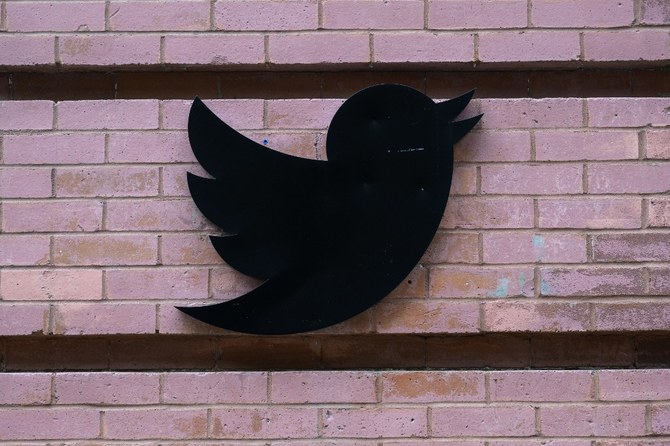LONDON: Since Twitter changed ownership last October, the platform has endured a profound and occasionally chaotic transformation.
The “Chief Twit,” as Twitter head Elon Musk described himself, and his team have introduced a number of radical changes over the course of six months in a bid to build an “alternative social media space.”
From drastic cost-cutting achieved by slashing half of Twitter’s workforce, to new features intended to generate income streams, Musk has sought to make Twitter profitable by ferrying it away from the classic social media advertisement-based revenue model.
After a false start, late last year Twitter started to roll out Twitter Blue, a new subscription-based multicolored verification system for users on the platform.
In a tweet, Elon Musk said the new system would help people better identify accounts, with gold ticks being assigned to business organizations, grey ticks to government-affiliated accounts or multilateral organizations, and blue ticks to individual accounts.
The company added that, as of April 1st, 2023, the new colored badges would effectively replace the so-called, blue-badged legacy accounts that were previously reserved for verified accounts of politicians, famous personalities, journalists and other public figures, unless they have subscribed to the Twitter Blue or Twitter Verified Organizations plan.
Twitter Blue was made available globally in late March, but people pointed out how the service lacks many of the features promised by the Tesla CEO.
The company’s announcement tweets list some of the benefits of Twitter Blue, such as a checkmark, the ability to write longer tweets, prioritized ranking in conversations, and half as many ads.
Twitter Blue is now available globally! Sign up today to get your blue checkmark, prioritized ranking in conversations, half ads, long Tweets, Bookmark Folders, custom navigation, Edit Tweet, Undo Tweet, and more. Sign up here: https://t.co/SBRLJccMxD
— Twitter Blue (@TwitterBlue) March 23, 2023
Those last two features, however, have not yet been released, and when users click on the links to sign up for the services, they are still marked as “Coming Soon.”
Subscription to Twitter Blue for individual accounts costs $8 per month via the web and $11 per month through in-app payment on iOS and Android, while subscription to its new Twitter Verified Organizations program costs businesses around $1,000 per month, plus $50 per month for each affiliated subaccount.
The elevated price tag, which may be considerably higher depending on where a user is located, led to an outcry on the internet and prompted several users to say they would be better off without any badge.
On Sunday, the New York Times became one of the first high-profile users to be stripped of its blue badge on Sunday after announcing that it would not pay for the service.
However, Saturday’s deadline to pay for blue checkmarks has passed, and the blue ticks still feature next to many users’ names.
Sources reported that Musk deleted a tweet saying that users would be given “a few weeks’ grace,” suggesting a gradual removal of the blue ticks.
However, according to internal Twitter documents cited by the New York Times, the platform could be planning a hybrid approach and exempt from the rules 10,000 of the most-followed users on Twitter.
Yet, this uncertainty has caused widespread confusion on Twitter, with users unable to differentiate between legacy accounts and Twitter Blue members.
Instead of taking away the blue checkmarks, Twitter on Sunday began appending a new message to profiles: “This account is verified because it’s subscribed to Twitter blue or is a legacy verified account.”
Many legacy verified Twitter users have expressed their disappointment at the idea of being mistaken for Twitter Blue subscribers.
“Nah man, just take it away. Don’t blanket me with those little Twitter blue wieners,” said Matt, Youtuber and co-host of GoonsPC, a popular comedy podcast.
Nah man, just take it away. Don’t blanket me with those little twitter blue wieners pic.twitter.com/mrsEbaYMoK
— Matt (@BlargMyShnoople) April 2, 2023
The Guardian columnist Owen Jones suggested Twitter’s decision was based on the fact that for many users “Twitter Blue has become a mark of shame,” and asked how it is “going to work given soon verification will mean ‘I paid Elon Musk to use Twitter’ in all cases.”
They’ve done this because Twitter Blue has become a mark of shame, fine, but how’s it going to work given soon verification will mean ‘I paid Elon Musk to use Twitter’ in all cases pic.twitter.com/tkREPVey7R
— Owen Jones (@OwenJones84) April 2, 2023
While legacy account holders await clarification, Musk has continued making promises to lure users to Twitter Blue saying that after April 15, the “For You” algorithmic timeline will only show verified accounts along with the accounts a person follows.
Meanwhile, the social network is also reportedly working on a government ID verification feature for Twitter Blue subscribers, which will let them hide their badges.
















